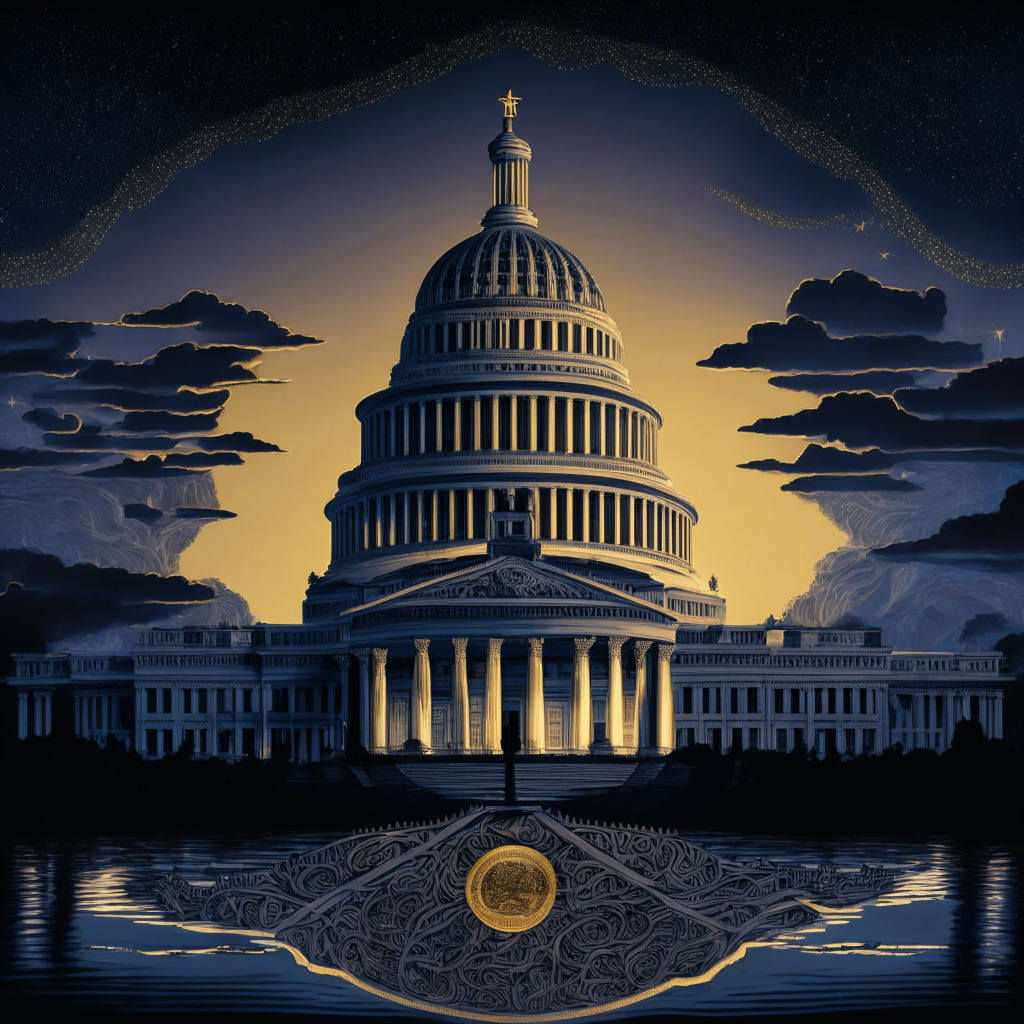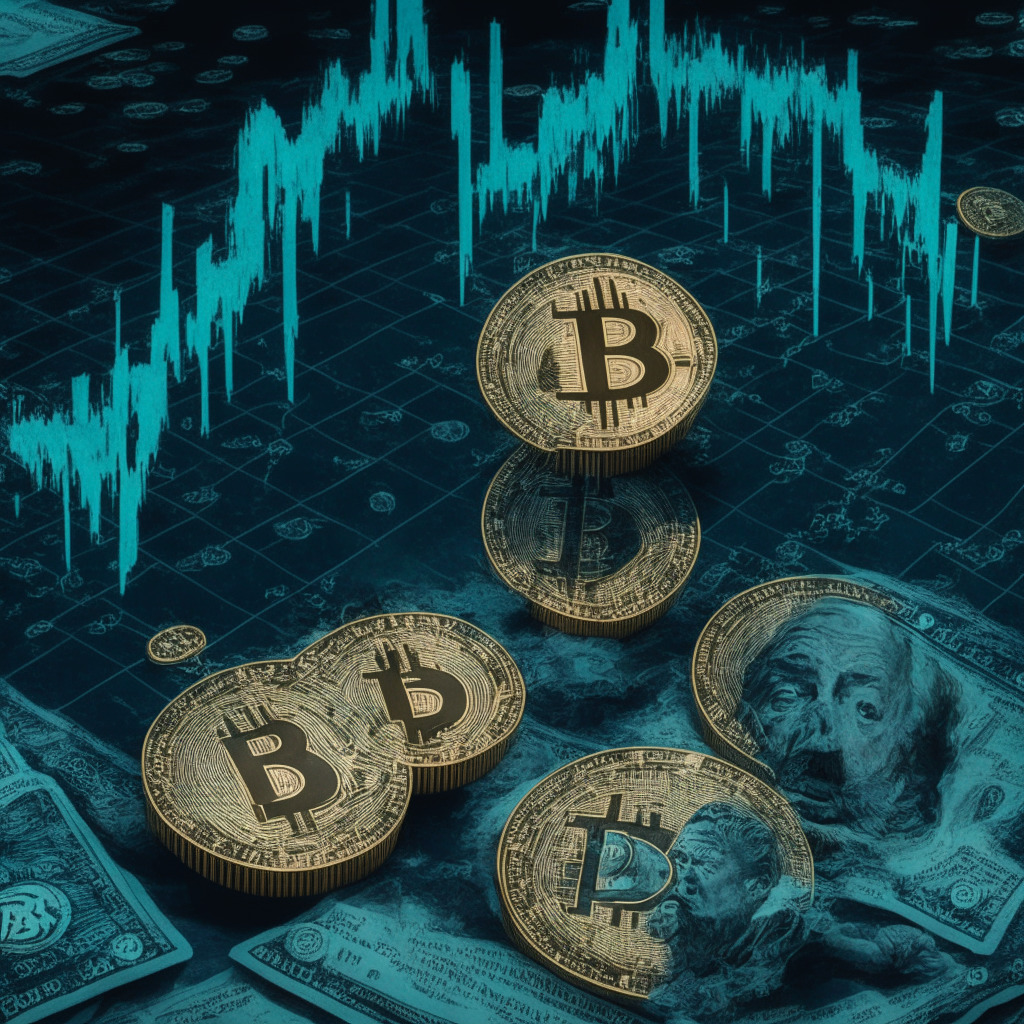“Regulation in the crypto world came under scrutiny after a lawsuit backed by Coinbase challenged the U.S. Treasury Department’s sanctions on Tornado Cash, a crypto transaction platform. Despite uproar from the crypto community, a judge ruled that the Treasury acted within its powers, escalating the ongoing tension between crypto advocates and regulatory bodies.”
Search Results for: U.S. Treasury
Bitcoin Stagnates vs BRC-20 Tokens Surge: U.S. Treasury Replenishment’s Impact on Crypto
The crypto market is in an accumulation phase, with Bitcoin below $27K and BRC-20 tokens nearing a $500 million market cap. The U.S. Treasury replenishment process and the future of BRC-20 tokens play significant roles in market development. Investors anticipate Ether’s growth and Litecoin’s halving event.
Poloniex Pays Millions in U.S. Treasury Settlement: Costly Compliance Lesson for Crypto Exchanges
In a recent development, cryptocurrency exchange Poloniex has agreed to pay a hefty sum of […]
Unleashing the Bull: Bitcoin’s Prospects Amid Rising U.S Treasury yields and Looming Economic Unrest
Recent developments in the US economy, such as rising treasury yields and national debt, suggest a bullish future for Bitcoin. Former crypto exchange CEO, Arthur Hayes, speculates this could lead to mass liquidity injections, possibly triggering a Bitcoin bull run. However, the volatile interplay between these economic factors also warrants caution.
Understanding the Recent Bitcoin Price Plunge: Navigating the Crosscurrents of Rising U.S. Bond Yields and Bullish Market Sentiment
Bitcoin’s recent price drop is attributed to several factors including a spike in U.S. bond yields, which strengthened the dollar and negatively impacted Bitcoin. Despite bearish indicators, some bullish market sentiment remains due to long position holders still paying for short positions.
Unraveling the Threads: The Dynamic Between Bitcoin Price and US Treasury Yields
“The intricate relationship between Bitcoin price and U.S. Treasury yields has been discussed with Bitcoin halvings often paralleling “relative local lows” in the 10-year Treasury yield. However, this correlation might not necessarily be a causal link. The dynamics driving Bitcoin’s price could be influenced more complexly, possibly by a shift towards riskier assets rather than trends in Treasury yields.”
The Tug of War: The U.S.’s Potential Leap into Digital Currency vs Fears of Surveillance
The U.S. House of Representatives is considering the introduction of a Central Bank Digital Currency (CBDC), amidst contrasting views. Democrat Rep. Stephen Lynch calls for a pilot project for a digital dollar, stressing it is “absolutely critical” for the U.S. to show leadership in digital currency development. However, concerns remain regarding transaction management, tracking, and potential regulatory limitation issues.
Navigating the Storm: Treasury’s Proposed Crypto Tax Rules Stir Controversy and Promise
The U.S. Treasury Department’s proposed digital assets tax rules have sparked controversy within the crypto community. The debate revolves around the feasibility of regulating decentralized operations and potential implications for wallet vendors, decentralized exchanges, and smart contract systems. Nonetheless, a clear taxation path might facilitate easier engagement with digital assets.
U.S. Government Debt Downgrade: A Storm Ahead for Bitcoin or A Silver Lining?
The U.S. Government’s debt downgrade by Fitch Ratings may impact the digital investment market, including Bitcoin. Investors are being driven from traditional assets into safer short-term instruments. Amidst this uncertainty, the potential lies for investors to shift towards decentralized avenues like cryptocurrencies.
Anticipating the Impact: Imminent U.S. Crypto Tax Overhaul & Its Potential Consequences
The U.S. is preparing for an overhaul of tax regulations concerning cryptocurrencies, causing uncertainty among crypto firms and industry insiders. These regulations aim to guide businesses on reporting customers’ tax positions, potentially legitimizing the crypto sector. However, timelines and specific implications remain uncertain, stirring industry anxieties and prompting calls for clearer guidelines.
U.S. Crypto Regulation: Balancing Innovation and Compliance in the Blockchain Era
“The U.S Congress moved closer to regulatory clarity with two crypto-related bills: the Financial Innovation and Technology for the 21st Century Act, aimed at crypto company registrations, and the Blockchain Regulatory Certainty Act, aiming to cut down barriers for blockchain developers. However, potential conflicts between lawmakers and industry operators may lead to strenuous compliance requirements, possibly bringing the crypto industry closer to traditional finance rules and limitations.”
Tether’s Rising Treasury Reserves: A Balancing Act between Expansion and Security
“Tether recently disclosed a Q2 attestation, revealing a $3.3 billion jump in its excess reserves. Despite raising market concerns due to increasing U.S. Treasury bill holdings, Tether maintains 100% reserves for USDT tokens and continues growing financially. Transparency around reinvested profits becomes key to investor confidence.”
U.S. Senate Tightens Crypto Regulations in NDAA 2024: A Necessity or Threat to Blockchain Freedom?
The U.S. Senate’s passage of the 2024 National Defense Authorization Act introduces tighter regulations for financial institutions engaged in crypto trading, marking a significant legislative shift. The bill targets crypto mixers and “anonymity-enhancing” crypto assets and aims to strengthen compliance with money laundering and sanctions laws.
Exploring the Rise of Tokenized Treasurys: Huge Market Growth vs Security Concerns
“Blockchain-based investment products that turn U.S. Treasury bills, bonds, and money market funds into tokenized forms amass a market value of $614 million, with the potential to reach $5 trillion over the next five years. However, the tokenizing assets trend needs regulatory oversight and potential market manipulation consideration.”
Bitcoin Plunges to $30,600: Unexpected U.S. Employment Data Shakes Financial Markets
The value of Bitcoin plunged to $30,600 following surprising US employment data indicating 497,000 private-sector jobs added in June. This resulted in significant financial market fluctuations, with speculation of further Federal Reserve rate hikes affecting crypto and stock markets negatively.
UK Treasury Rejects Crypto Tsar: Pros, Cons, and Future of Crypto Regulation
The U.K. Treasury rejects appointing a ‘crypto tsar,’ as suggested by the Crypto and Digital Assets All Parliamentary Group, and instead focuses on regulating the crypto sector as financial services with the existing financial regulators. Andrew Griffith, the economic secretary, affirms his support for the crypto industry and welcomes Andreessen Horowitz’s expansion into London.
Impact of $173B Treasury Bills Auction on Crypto Market: Risks and Opportunities Explained
The U.S. Treasury Department’s $173 billion Treasury bills auction could drain U.S. dollar liquidity from the financial market and increase selling pressure on the crypto market, including Bitcoin. This move raises the risk of recession and may result in higher volatility and weaker returns for cryptocurrencies. However, the long-term outcome remains uncertain, as some investors may hedge against recession and inflation with digital currencies.
Circle Ditches US Treasury Bonds for USDC: A Wise Move amid Debt Ceiling Showdown?
In response to potential market turbulence due to the U.S. debt ceiling showdown, Circle Internet Financial has divested from U.S. Treasury bonds, backing its USD Coin (USDC) with overnight repurchase agreements instead. This strategic move aims to protect the USDC stablecoin from potential bond market disruptions as lawmakers scramble to avoid a government default. The effectiveness of this strategy remains uncertain.
Debt Ceiling Negotiations: Impact on Crypto Market and US Treasury Bonds
The ongoing deadlock in US government debt limit negotiations could potentially negatively impact the crypto market. A successful deal may lead to a withdrawal of liquidity from the system, affecting bitcoin and gold prices. The crypto market could face adverse consequences due to its dependence on fiat liquidity.
Debt Ceiling Increase: How Bitcoin Could Face Losses Amid Rising Treasury Liquidity
Bitcoin could face losses in Q3 2023 due to the expected agreement on raising the U.S. debt ceiling, which might increase Treasury’s liquidity and impact risk asset markets, including cryptocurrencies. Bitcoin may struggle to reclaim yearly highs, with prices likely ranging between $20,000-$30,000 unless a new narrative or significant catalyst emerges.
US Debt Ceiling Crisis: Gold, Treasury Bonds, and Bitcoin as Top Safe-Haven Assets
A recent Bloomberg survey reveals that in case of a U.S. debt default, investors would turn to gold, U.S. Treasury Bonds, and Bitcoin as top assets. This highlights shifting perceptions of cryptocurrencies as potential safe-haven assets in the broader financial landscape amidst economic uncertainty.
Is PayPal’s Ethereum-based Stablecoin, PYUSD, Truly 100% Asset-Backed? Examining the Claims
“PayPal’s Ethereum-based stablecoin, PYUSD, has full asset backing, primarily from U.S. Treasury reverse repurchase agreements, says Paxos. Though overcollateralization safeguards assets, it could limit profits. Some PYUSD assets are in uninsured cash deposits, reflecting typical banking risks. PYUSD’s transparent operation may soothe some investors while raising others’ skepticism.”
USTY Tokens: Revolutionizing the Financial Sector Despite Intense Rivalries and Market Volatility
“USTY tokens, a tokenized version of shares in a U.S. Treasury bond ETF, are the prime example of the tokenization of real-world assets. This transition towards tokenization could create a $5 trillion market within five years. Despite challenges, tokenization has potential to transform financial infrastructure, backed by nearly sixfold increase in demand for tokenized Treasuries to $622 million this year.”
Decoding the Legal Matrix: Tornado Cash, DAOs, and the Future of Blockchain Oversight
A recent legal case saw a federal judge approving U.S. Treasury’s sanctions on Tornado Cash, a crypto tool allegedly used by North Korea for money laundering. The ruling, which validated an enforcement action against a Decentralized Autonomous Organization (DAO), sets a compelling precedent for DAOs’ future role in crypto projects.
Surge in Blockchain-Based T-Bill Offerings: A Financial Boom or Hidden Risk?
Maple Finance, a blockchain-based credit marketplace received a green light to open its cash management pools for U.S. investors. This opens opportunities for investors to park their stablecoin holdings in one-month U.S. Treasury bills, earning a 4-5% annual yield. While the crypto ecosystem appreciates the opportunities, concerns loom over potential risks.
Debating the CANSEE Act: Crypto’s Regulatory Future or Innovation Stifler?
The Crypto-Asset National Security Enhancement and Enforcement (CANSEE) Act, aims to enforce stricter KYC/AML regulations on decentralized finance (DeFi) operations. Critics worry that the bill, requiring financial responsibility from project investors, can deter potential backers. The act also plans to increase anti-money-laundering capabilities of the U.S. Treasury Department extending to nontraditional financial structures like cryptocurrency.
Balancing Privacy and Efficiency in Retail CBDCs: Pros, Cons, and Conflicts
U.S. Treasury official Graham Steele highlighted the importance of privacy and anonymity in developing a potential retail Central Bank Digital Currency (CBDC) and suggested that Privacy Enhancing Technologies be considered for preserving user anonymity. Steele also discussed pros, cons, and challenges, including minimizing illegal transactions and ensuring privacy.
Balancing Privacy and Transparency: Pros and Cons of a US Central Bank Digital Currency
The U.S. Treasury Department explores Privacy Enhancing Technologies (PETs) to protect privacy and anonymity in potential digital dollar transactions. As the U.S. considers introducing a Central Bank Digital Currency (CBDC), addressing risks and striking a balance between privacy and transparency remain top priorities for policymakers.
Crypto Superapp Finblox Enters Tokenized T-Bill Market: Opportunities and Challenges Explored
Crypto investment platform Finblox enters the tokenized U.S. Treasury bills market, aiming to position itself as a “crypto superapp” offering various financial services. The flourishing $500 million asset class allows investors to allocate stablecoins in short-term government bonds for safer returns.
Exploring MakerDAO’s $1.28B Bet on Real-World Assets: Boosting Yield or Risky Undertaking?
MakerDAO’s community voted to open the BlockTower Andromeda vault, aiming to invest up to $1.28 billion in short-dated U.S. Treasury bonds using overcollateralized DAI stablecoin. This reflects efforts to diversify reserve assets, generate higher yields, and integrate crypto with traditional financial markets.
Crypto Market Volatility Looms as US Debt Ceiling Lifts and Liquidity Tightens
Crypto markets may face a downturn as liquidity tightening resumes after the U.S. debt ceiling is lifted, resulting in the replenishment of the U.S. Treasury General Account (TGA) and the Federal Reserve winding down its balance sheet. This scenario could pressure cryptocurrency prices in the coming months, affecting risk assets like cryptocurrencies and metaverse projects.
US Debt Ceiling Dilemma: Impact on Crypto and Financial Markets, A Dual-Edged Sword
The U.S. debt ceiling deadline creates uncertainty in financial markets, affecting both traditional and cryptocurrency assets. As the U.S. Treasury risks a negative balance by Friday, negotiations on the $31.4 trillion debt ceiling raise will impact economic and blockchain future.































